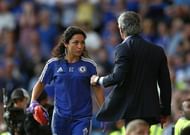Football loves a fairytale story. The circle of joy, loss and redemption is embedded into the game and is a part of its fabric. From clubs overcoming insurmountable odds to players fighting their way back to the forefront from the brink of oblivion, the beautiful game and its spectators have been lucky enough to witness some of the most poignant tales of resurrection.
One such tale is that of Chelsea and Jose Mourinho. After arriving in spectacular fashion in the summer of 2004, the Portuguese heralded in an era of success, domination and silverware for the London club. By the time he was unceremoniously sacked in September 2007, Mourinho’s Blues had racked up two Premier League titles, two League cups and one FA cup – the most fruitful three-year spell in Chelsea’s history.
Perhaps the owner, Roman Abramovich, was too quick to fire Mourinho. Or perhaps their relationship had reached a natural ending point, where divorce was the only option for them both to continue being happy. Whatever the reasons for Mourinho’s first departure from Chelsea, it was clear that there was always a chance of reconciliation. Mourinho had always been open about his love for Chelsea, and the Chelsea fans also held the Special One in high esteem.
From 2007 to 2013, Chelsea went through a period of managerial upheaval, player revolts and controversies, all the while winning silverware in the form of a Champions League trophy, a Europa League trophy, three FA cups and a Premier League title. In the same period, Mourinho led his teams – Inter Milan and then Real Madrid – to three league titles, two league cups and a Champions League trophy.
Clearly, neither needed the other to survive and succeed. Good times were had by both, just not in each other’s company.
Mourinho’s second stint at Chelsea had an eye on the future
What prompted both parties to extend an olive branch and make amends will never be known. Perhaps Abramovich longed for peace after years of war. Maybe Mourinho decided it was time to settle down. Whatever the reasons, what is true is that June 2013 saw the revival of the Mourinho-Chelsea relationship.
And it all started to fall into place, slowly but surely. In his first season back with Chelsea, Mourinho laid the foundations for a period of domination with shrewd signings and an eye on the future in terms of youngsters that arrived, or were, at the club. This seemed like a deliberate and well-thought out strategy for the future and not a scattergun approach for immediate success.
The second season bore the fruits sown in the first, as Chelsea cantered their way to yet another Premier League and League Cup double. And with the likes of Eden Hazard, Oscar, Fabregas and Thibaut Courtois yet to reach their prime, coupled with the experience of Terry, Cahill, Ivanovic and Ramires, Chelsea seemed to have the right mix and were widely tipped to dominate European football, let alone English football.
How wrong was that prediction?
Disaster strikes in Mourinho’s third season – again
Following a disastrous start to the season, it seems Murphy’s law has well and truly made its home at Chelsea. Key players consistently underperforming, a manager showing signs of not having the dressing room in control, match after match showcasing the ineptitude of star players in being able to do the basics right, player behavioural issues on and off the field, red cards and disciplinary issues, key moments in a match always going the other way, the unimaginable ascent of lower-table teams, a tough fixture list.
All of the above have worked in unison to rip the club apart and destroy it from the inside out. On top of that, there is still the small matter of ex-Chelsea physio Eva Carneiro taking legal action against Jose Mourinho, citing unfair termination.
All that could have gone wrong, did go wrong.
The easiest move for Roman Abramovich would, of course, be to fire Jose Mourinho before more, irreparable damage is done to the club’s brand value. The manager is the most important person at a football club, that’s why he is the first to go when things swiftly move from bad to worse.
Sacking Mourinho is not the right way forward
What of the players? Surely they cannot be absolved of all the blame when results are bad. If Eden Hazard suddenly seems disinterested in fighting for the club on the pitch, or an Ivanovic goes from one of the best right-backs in the world to a complete liability in the space of 3 months, then an under-performing manager is the least of Chelsea’s worry. The problem runs deeper, and so must the solution.
Doing the easy thing is most often not the same as doing the right thing. Sacking Mourinho, Chelsea’s most successful and loved manager, would be one step forward and two steps back. There is a danger that the club could once again fall back to its bad habits of player power forcing managers out just because his methods are not their cup of tea. Mourinho’s sacking would trigger yet another spell of chaos, and the hard-earned stability that the club has acquired would be lost in the blink of an eye.
Then there’s also the youngsters and loaned-out players that Chelsea could use. Sure, a Ruben Loftus-Cheek or a Kenedy may not have the same immediate impact as a Fabregas or a Hazard. But promising yet inexperienced youngsters will always be a safer gamble than disgruntled, disinterested superstars.
Abramovich needs to take a deeper look at the dressing room and sort out the bad apples from the good ones. Key players can be replaced; there is no such thing as an indispensable player in football. There’s always a better player out there than what you have.
The same cannot be said of a world-class manager.
Most importantly, it is time for Chelsea and Abramovich to stick rather than twist. It’s time to back the decision of having appointed Mourinho with an eye towards the future, for a more stable Chelsea.
It is the only way to stop the vicious cycle of chaos and instability that has long been the identity of Chelsea.




